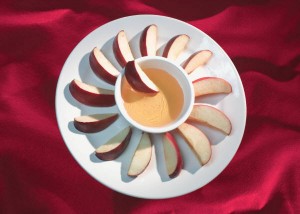 You paint the floor.
You paint the floor.
You start at the door.
In a corner, you suddenly realize you are trapped. You think – “How am I going to get out without stepping on the paint?”
What Do you do?
We encounter similar situations in life.
We put ourselves in a situation, that leads to another until we are in a corner.
Examples abound.
“That person is so nice. Let me become friendly.” You think “They are fun to be with but not a person who would be a mate for marriage.” It becomes a dead-end relationship. You’ve been together for so long, Should you decide to tie the knot on not… Both are ambivalent. The marriage ends in divorce. Or remaining unmarried, after years it ends off with a break-up. Tender years that one could have spent raising a family were spent perusing the bars.
We spend on our credit cards. “I’ll pay it back. $25,000 in credit – I might as well use it!” After a couple of months… “Where will I get the money to pay back?”
“Let me go to Atlantic City to have a good time. I’ll bet Just $100 – the chips that the Casino gives as a perk…”
What now?
Let’s first deal with how not to get painted into a corner and then we’ll see how to get out.
Rule 1 to not get painted into a corner is – Know your specific goal and pursue it. Don’t get side tracked
Precise Goals
A Torah Jew has very precise goals to start with. One goal is: To get married. They don’t date to have fun. Not that they don’t have fun on dates. They surely do. But the purpose is not to have a good time. It is to find the right partner for marriage.
So they start -before dating someone – with a list of requirements – which includes – Jewish, Good character traits, Torah observant, personable, kind-hearted, similar-goals in life, etc.
When they find someone that has these traits and they can get along with, they already settled half of the problems that arise in a marriage.
Rule 2 – Think about the repercussions of your actions
In Pirkei Avot / Ethics of the Fathers it discusses “What is the good path for man?”
The Path of Good
He [Rabban Yohanan ben Zaccai] said to them [his students] – go out and see which is the good path to which a person should cleave. Rabbi Eliezer says a good eye, Rabbi Yehoshua says a good friend, Rabbi Yossi says a good neighbor Rabbi Shimon says one who sees the outcome of his actions and Rabbi Elazar says a good heart. He said to them I see the words of Rabbi Eleazar ben Arach from your words – for included in his words are your words. (Pirkei Avot / Ethics of the Fathers 2:9)
One thing to remember is seeing the results of ones actions and having the ends in mind at the beginning.
An anecdote:
A wealthy man was on the train. A young man next to him asked him for the time. The man didn’t respond. His wife asked “why didn’t you respond?” He answered “Because – after he asked me the time he would have asked me about what I do. I would have told him. He would have inquired about our family. And I would have told him. He would have inquired if we have a daughter of marriageable age. Then He would have asked to see if he could meet her. I don’t want my daughter meeting a boy who can’t even afford a watch.”
Obviously, this is a joke. But there is truth to it, that one has to see the repercussions of one’s actions. Not just the immediate results.
Rule 3 – Make a conscious, thought-out decision to continue or stop. And stick to it.
Some people go on endless dates and can’t seem to decide if a potential mate is appropriate for them for marriage. Yes there must be chemistry, but if one mate wants to party in the club scenes on Friday nights and the other wants to spend a meaningful Shabbat evening together with the family, it might be better to stop right then. One should examine the goals of the others – If one’s main goals is on material luxuries and the other one’s main goal is on building a solid family that will follow in the pleasant ways of the Torah – it seems that parting might be a better solution than continuing.
Make a decision not because you feel guilty about the past, but because you see a positive outcome for the future.
Rule 4 – Make Torah guidelines your own.
The Torah is here for the good of people. Gambling is frowned upon in Judaism. Thus, being sincere to Torah, one will altogether avoid a casino to begin with. A Jewish person will refuse dating out of the Jewish brotherhood. They know that the Torah guidelines for life make for a more compatible and spiritually satisfying marriage.
Make yourself into the person you want to be. Make yourself into a person similar to a person you want to meet. Some advice I give to singles is – to reinforce themselves in Judaism before they get married.
Why?
G-d will help you to be paired with someone who is similar to you.
If you are hanging out at bars and discos, you will likely meet someone who hangs out there.
If you are observing the Shabbat, then G-d will likely have you meet someone who observes the Sabbath.
If you want your spouse to appreciate Torah, attend Torah lectures or learn Torah regularly.
The greater you make yourself, the greater the spouse G-d will pair you with.
Obviously, you must do your proper effort to meet the right people. You must do the due diligence to check them out though references and pointed questions before you meet. But the general way of the world – is you meet people similar to yourself.
Parents that want their children to marry Jewish, would do good to observe the Shabbat and the Mitzvot carefully. They would gain by associating themselves with an Orthodox synagogue, with respectable Rabbis and people who appreciate Torah Judaism. Living in a Jewish Neighborhood helps. Learning Torah regularly also is recommended. Sending Children to a Torah day school is one of the most powerful ways to assure children marry Jewish.
Rule 5 – Discuss your situation with a person whose Situation you’d like to be in.
You see a person with a solid family. They have good values. A family that spends time together and are so together. A family that enjoys Shabbat meals together and good times. You are a single person, looking for satisfaction in life. You would like to build a family. Talk with the person who seems to be already where you would want to be for advice. Obviously, you must know the person enough that you are relatively confident that you can trust the person.
Already in a Corner – Set Yourself Free
The Emotional Corner – Emotional Freedom
An emotional corner is when you build up your expectations for something and then when you don’t get it, you are upset, angry, hurt, or depressed. One way to avoid this is instead of having one positive outcome – and one negative one – have two positive outcomes if it works out or not.
I need a car. My car is at the mechanic. I eye a car at a local car dealership. I save my money and go to the dealer to buy a “pre-owned” vehicle. That perfect one I wanted – I find out it was sold the day before.
I have two possible ways to react – I can be upset because I didn’t get the car I wanted.
This would happen if I set myself up – with the thought – if I get the vehicle – that is good. If I don’t that is bad.
Or I could be happy – because, perhaps the vehicle I wanted was not right for me.
This would happen if I set myself up – with the thought – if I get the vehicle – that is good. If I don’t that is good also, because G-d does the best for me. Having faith in the goodness of G-d helps one maintain a positive attitude – for everything that happens – whether good or whether it looks bad, is good.
Situational Corner – Freeing Yourself
At times one gets moments of clarity and they realize – for instance, that they just spent 10 precious years of their life with someone who had no intention of marriage or building a family. So what now? Take action. Look at the future. Save the future.
Once a man checked His Tephillin / Phylacteries after using them for 2 years. He found that they were not Kosher. His friends asked aren’t you upset for the past? He answered “No. I am happy that now that I fixed them I will be able to do the Mitzvah of wearing Tephillin properly in the future.”
Don’t sulk about the past and soak in tears of self-pity. Do something. You have a positive future ahead of you.
In a corner? Seek help from family and true friends. Seek guidance from a reputable Orthodox Rabbi. And of course pray to Hash-m. He has the power to remedy any situation for the good.
The Torah states even if the sword is against one’s neck they should never give up hope of salvation from Hash-m.
 Yom Kippur is the day of atonement. The Day when G-d seals the judgement made on Rosh Hashana. The Day Before Yom Kippur it is a Mitzvah / commandment to eat more.
Yom Kippur is the day of atonement. The Day when G-d seals the judgement made on Rosh Hashana. The Day Before Yom Kippur it is a Mitzvah / commandment to eat more.








